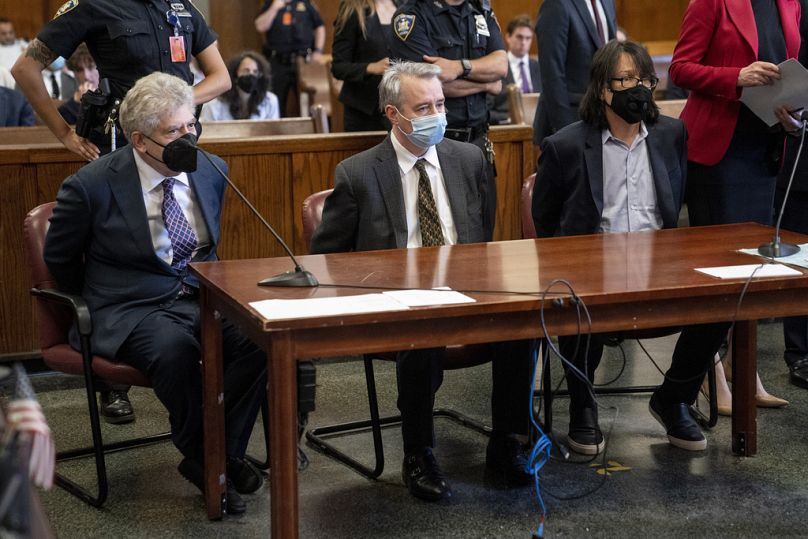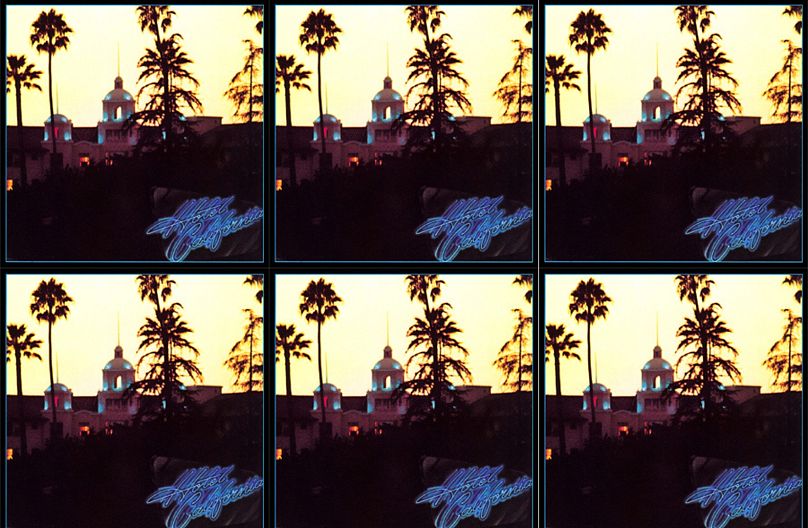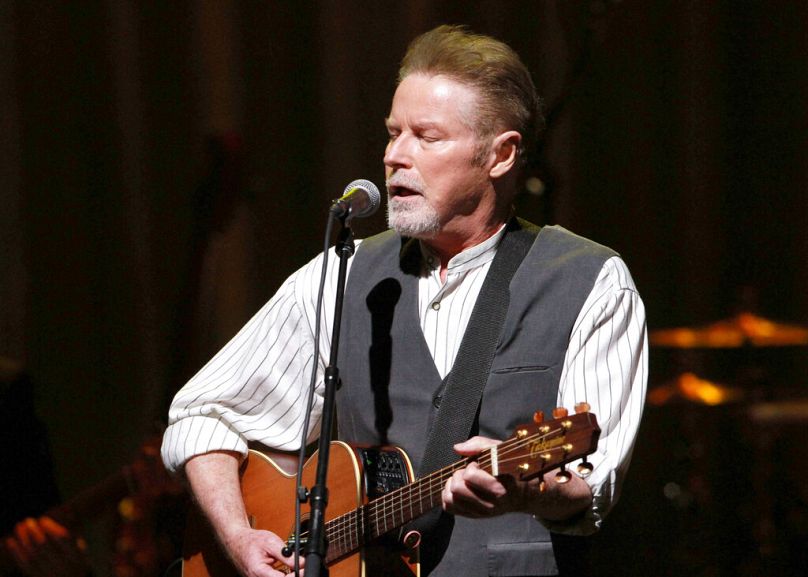The handwritten lyrics to the Eagles’ megahit first went missing in the 1970s. Three men are accused of conspiring to illegally own and sell them in a complex trial that opens Wednesday.
In 1976, the Eagles released their dark ballad about the perils of pursuing the American dream.
 ADVERTISEMENT
ADVERTISEMENT
 ADVERTISEMENT
ADVERTISEMENT
The lyrics, written by Don Henley with input from co-founder Glenn Frey, began: “On a dark desert highway / cool wind in my hair…” It was brooding and mysterious - and it was an overnight hit.
‘Hotel California’ would become a cultural phenomenon, one of the most recognisable and most-played songs on the planet.
But nearly half a century later, the pages of the lined yellow notepad that Henley wrote the original lyrics on have found themselves at the centre of a complex and unusual trial that opens in New York this Wednesday (21 February).
The facts of the case are hard to unravel, with multiple parties involved and conflicting storylines that prosecutors will need to make sense of before the court. Here’s what we know so far about the case.
Who are the defendants?
Three men are charged with “conspiring to own and try to sell manuscripts” of ‘Hotel California’ and other Eagles hits, without the right to do so.
The defendants are rare-book dealer Glenn Horowitz, former Rock & Roll Hall of Fame curator Craig Inciardi and memorabilia seller Edward Kosinski.
Horowitz has handled huge rare book and archive deals, and he's been entangled in some ownership disputes before. One involved papers linked to "Gone With the Wind" author Margaret Mitchell. It was settled.
Inciardi worked on notable exhibitions for the Cleveland-based Rock Hall of Fame. Kosinski has been a principal in Gotta Have It! Collectibles, known for auctioning celebrities' personal possessions – so personal that Madonna unsuccessfully sued to try to stop a sale that included her latex briefs.
What are the charges?
The three men are not actually accused of stealing the Eagles’ documents themselves, but rather of trying to sell the documents despite knowing that Henley claimed they were stolen.
At issue are over 80 pages of draft lyrics from the blockbuster 1976 "Hotel California" album, including words to the chart-topping, Grammy-winning title track.
The pages also include lyrics from songs including ‘Life in the Fast Lane’ and ‘New Kid in Town.’ Eagles manager Irving Azoff has called the documents "irreplaceable pieces of musical history."
The three men have pleaded not guilty, and their lawyers have said the men committed no crime with the papers, which they acquired via a writer who had worked with the Eagles.
The Manhattan district attorney's office argues the defendants knowingly connived to obscure the documents' disputed ownership.
If the defendants aren’t accused of stealing them, how did the lyrics originally go missing?
This is where the case gets complicated.
No one has actually been charged with stealing the documents, but prosecutors will still have to establish that the documents were stolen. The defence maintains that's not true.
Much of the case turns on the Eagles' interactions with Ed Sanders, a writer who also co-founded the 1960s counterculture rock band the Fugs.
He worked in the late '70s and early '80s on an authorised Eagles biography that was never published. While Sanders isn’t charged in the case, he is cited as selling the pages to Horowitz, who then sold them to Inciardi and Kosinski.
In a 2012 email, the writer – who was not named in the original indictment – admitted that he didn’t remember exactly how he got hold of the documents.
Henley told a grand jury he never gave the biographer the lyrics, according to court filings from Kosinski's lawyers. But defence lawyers have signalled that they plan to probe Henley's memory of the time.
"We believe that Mr. Henley voluntarily provided the lyrics to Mr. Sanders," attorney Scott Edelman said in court last week.
Sanders told Horowitz in 2005 that while working on the Eagles book, he was sent whatever papers he wanted from Henley's home in Malibu, California, according to the indictment.
Why is this trial so unusual?
There are a number of things that make this trial remarkable. First, is the fact that the key witness is nothing short of rock and roll royalty.
Henley is expected to testify before the court between Eagles tour stops. The band is currently on their “The Long Goodbye” tour across the United States.
The non-jury trial could offer a peek into the band's creative process and life in the fast lane of '70s stardom.
By all accounts, the "Hotel California" album is one of the most successful rock albums in history. It sold 26 million copies across the US over the years, bested only by an Eagles' greatest hits disc and Michael Jackson's "Thriller."
Defence lawyers argue that Henley’s star power even persuaded prosecutors to take up his cause, instead of the artist pursuing a civil suit himself.
The DA's office worked closely with Henley's legal team, and an investigator even yearned for backstage passes for an Eagles show – until a prosecutor said the idea was "completely inappropriate," Kosinki's lawyers said in court papers.
Prosecutors have rebuffed questions about their motivations as "a conspiracy theory rather than a legal defence."
There’s also the unusual nature of the case – clashes over valuable collectibles are common, but criminal trials like this are rare. Many fights are resolved in private, in lawsuits or with agreements to return the items.
"If you can avoid a prosecution by handing over the thing, most people just hand it over," said Travis McDade, a University of Illinois law professor who studies rare document disputes.
What are the conflicting stories?
Once Henley decided to pursue legal action in 2012, after Kosinski’s business put some pages up for sale at auction, the explanation of where the documents came from became increasingly muddled.
Horowitz, Inciardi and Sanders gave conflicting accounts of the documents’ provenance, according to the indictment.
In one story, Sanders found the pages discarded in a backstage dressing room. In others, he got them from a stage assistant or while amassing “a lot of material related to the Eagles from different people.”
Yet another story said Sanders obtained the documents from Frey, who died in 2016 and can’t corroborate the facts.
Sanders supplied or signed off on some of the varying explanations, according to the indictment, and it's unclear what he may have conveyed verbally to Horowitz and Inciardi. But he apparently rejected at least the dressing-room tale.
Kosinki forwarded one explanation, approved by Sanders, to Henley's lawyer. Kosinski also assured Sotheby's auction house that the musician had "no claim" to the documents and asked to keep potential bidders in the dark about Henley's complaints, the indictment says.
Sotheby's – which isn’t charged in the case – listed the ‘Hotel California’ song lyrics in a 2016 auction but withdrew them after learning the ownership was in question.













